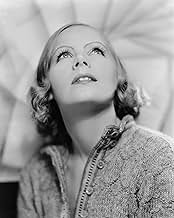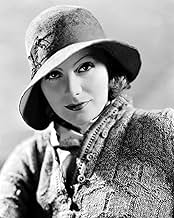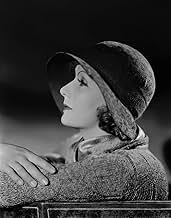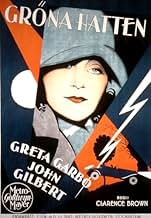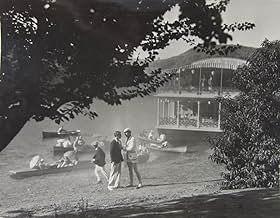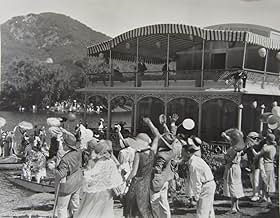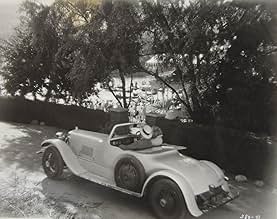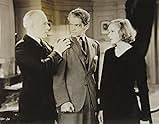IMDb RATING
7.1/10
1.8K
YOUR RATING
When two childhood sweethearts are kept from marrying, misery ensues.When two childhood sweethearts are kept from marrying, misery ensues.When two childhood sweethearts are kept from marrying, misery ensues.
- Nominated for 1 Oscar
- 2 wins & 1 nomination total
Johnny Mack Brown
- David Furness
- (as John Mack Brown)
Gertrude Astor
- Party Guest
- (uncredited)
Agostino Borgato
- French Police Inspector
- (uncredited)
Sydney Jarvis
- Gendarme
- (uncredited)
Fred Kelsey
- Detective
- (uncredited)
Anita Louise
- Diana - as a Child
- (uncredited)
Alphonse Martell
- French Hotel Concierge
- (uncredited)
William H. O'Brien
- Man Peering Into Room
- (uncredited)
Frank Finch Smiles
- Butler
- (uncredited)
Featured reviews
This film is a great Garbo vehicle, and has such a perfect example of her mystique. She somehow manages to be a woman who enjoys sexual pleasure and the company of men, but at the same time, is saintly, with a love that is pure for only one man, and sacrifices herself in more than one way ... and she is transcendent on both sides of this coin. The film is packed with moments where a range of her wonderful expressions are on display, some vivid, some subtle. If you're a Garbo fan or want to become one, this would certainly not be a bad place to start.
Unfortunately, the film suffers a bit from a heavy dose of melodrama, most of which seems pretty contrived. The plot often doesn't make a lot of sense, in part because the original story was watered down pretty significantly for the censors. An example of this is the questioning of Garbo after her husband has committed suicide. It's obvious why this happened; he was about to be arrested for embezzlement and the police saw him jump, so the viewer (ok me anyway) is watching the aftermath thinking huh? In the original, however, it was because he has syphilis, something that was obviously a personal secret, and hence the questioning (and also later shunning) of Garbo. There are other examples that took too much of the edge off the story and made it less sensical.
Garbo dominates the film, but it's a fine cast behind her. John Gilbert is given less to do here which is too bad, but the chemistry the pair had is quite evident in a couple of open lip kisses. Dorothy Sebastian is radiant as a virtuous woman, and Douglas Fairbanks, Jr. is suitably desperate as an alcoholic.
The film touches on marrying someone who is decent and loving them for that quality, but being passionate and truly in love with someone else, which is a timeless theme. The scene where Garbo is waiting in her honeymoon bed and gets a tepid kiss on the forehead, then in frustration resorts to turning on and off the overhead light after being left alone says it all. At one point her real love, played, by Gilbert, asks "Why did I ever let you go?" to which she responds "Yes, why?", and I don't think the film gives a good answer to this question, especially as it plays out. The pace as it does so is a little on the slow side too, and the dramatic ending is over-the-top. It's a near miss for getting a higher rating, but it's certainly watchable for Garbo.
Unfortunately, the film suffers a bit from a heavy dose of melodrama, most of which seems pretty contrived. The plot often doesn't make a lot of sense, in part because the original story was watered down pretty significantly for the censors. An example of this is the questioning of Garbo after her husband has committed suicide. It's obvious why this happened; he was about to be arrested for embezzlement and the police saw him jump, so the viewer (ok me anyway) is watching the aftermath thinking huh? In the original, however, it was because he has syphilis, something that was obviously a personal secret, and hence the questioning (and also later shunning) of Garbo. There are other examples that took too much of the edge off the story and made it less sensical.
Garbo dominates the film, but it's a fine cast behind her. John Gilbert is given less to do here which is too bad, but the chemistry the pair had is quite evident in a couple of open lip kisses. Dorothy Sebastian is radiant as a virtuous woman, and Douglas Fairbanks, Jr. is suitably desperate as an alcoholic.
The film touches on marrying someone who is decent and loving them for that quality, but being passionate and truly in love with someone else, which is a timeless theme. The scene where Garbo is waiting in her honeymoon bed and gets a tepid kiss on the forehead, then in frustration resorts to turning on and off the overhead light after being left alone says it all. At one point her real love, played, by Gilbert, asks "Why did I ever let you go?" to which she responds "Yes, why?", and I don't think the film gives a good answer to this question, especially as it plays out. The pace as it does so is a little on the slow side too, and the dramatic ending is over-the-top. It's a near miss for getting a higher rating, but it's certainly watchable for Garbo.
Greta Garbo was the antithesis of the old fashioned, expressive silent movie actors of yesteryear. Instead of wildly moving her arms and gesturing her emotions with her total body, the Swedish actress expressed her characters' emotions by way of little hints of facial movements. A perfect example of her subtle acting expressions is seen in her third movie with actor and lover John Gilbert in December 1928's "A Woman of Affairs."
Movie critic David Denby described her acting style in the way she lowered her "head to look calculating or flutters her lips. Her face darkens with a slight tightening around the eyes and mouth; she registers a passing idea with a contraction of her brows or a drooping of her lids. Worlds turned on her movement."
"A Woman of Affairs" was another huge money-maker for MGM. The movie proved that Garbo was becoming a printing press of dollar bills for the studio. This was her fifth Hollywood film, and the adoring public continued to flock to movie houses nationwide to witness those slight yet profound expressions. As a contemporary reviewer penned in 1929, "She has glamour and fascination for both sexes which have never been equaled on the screen." Based on a 1925 play adapted from the 1924 best-selling but controversial novel The Green Hat, by Michael Arlen, "A Woman of Affairs" forced MGM to rework some the important details mentioned in both the novel and the play that included descriptions of syphilis, miscarriages and heroin use. The Will Hays Production Code frowned on those topics. The story, set in England, focuses on three childhood friends, Neville (John Gilbert), who falls for friend Diana (Garbo). An assignment to Egypt causes Neville to miss his opportunity to marry Diana, who ends up crossing the threshold with her other childhood friend, David (Johnny Mack Brown). During their honeymoon, David commits suicide for embezzlement. Setting off a soap opera-like drama is Diana's eye-popping discovery that Neville has returned to England several years later with a new-found love in Constance (Dorothy Jeffry).
Critics point out the movie's highlight occurs when Garbo is in the hospital nine months after she spent an evening over Neville's house. It's hinted she's had a miscarriage, which explains her passion to cradle a bundle of flowers. The sequence displays every emotion an actress can possibly show: from crying, to loving, to questioning, to a sense of loss and hope. Garbo informs the viewers all this simply by her facial expressions. Because of such a highly emotional sequence in the hospital, Garbo's clout with the studio was so valuable that MGM granted her the unusual request that visitors, including studio executives, be restricted from the set. The actress even asked black screens be built surrounding the area she was filming so extras and even technicians couldn't view her acting. Garbo defended her closed sets by explaining "If I am by myself, my face will do things I cannot do with it otherwise."
No one could argue about the results Garbo gave on the big screen. And the beancounters in the studio's accounting room stood by the actress's on-set demands after their offices were flooded with the receipts from the tremendous amount of tickets she sold under the MGM logo.
Movie critic David Denby described her acting style in the way she lowered her "head to look calculating or flutters her lips. Her face darkens with a slight tightening around the eyes and mouth; she registers a passing idea with a contraction of her brows or a drooping of her lids. Worlds turned on her movement."
"A Woman of Affairs" was another huge money-maker for MGM. The movie proved that Garbo was becoming a printing press of dollar bills for the studio. This was her fifth Hollywood film, and the adoring public continued to flock to movie houses nationwide to witness those slight yet profound expressions. As a contemporary reviewer penned in 1929, "She has glamour and fascination for both sexes which have never been equaled on the screen." Based on a 1925 play adapted from the 1924 best-selling but controversial novel The Green Hat, by Michael Arlen, "A Woman of Affairs" forced MGM to rework some the important details mentioned in both the novel and the play that included descriptions of syphilis, miscarriages and heroin use. The Will Hays Production Code frowned on those topics. The story, set in England, focuses on three childhood friends, Neville (John Gilbert), who falls for friend Diana (Garbo). An assignment to Egypt causes Neville to miss his opportunity to marry Diana, who ends up crossing the threshold with her other childhood friend, David (Johnny Mack Brown). During their honeymoon, David commits suicide for embezzlement. Setting off a soap opera-like drama is Diana's eye-popping discovery that Neville has returned to England several years later with a new-found love in Constance (Dorothy Jeffry).
Critics point out the movie's highlight occurs when Garbo is in the hospital nine months after she spent an evening over Neville's house. It's hinted she's had a miscarriage, which explains her passion to cradle a bundle of flowers. The sequence displays every emotion an actress can possibly show: from crying, to loving, to questioning, to a sense of loss and hope. Garbo informs the viewers all this simply by her facial expressions. Because of such a highly emotional sequence in the hospital, Garbo's clout with the studio was so valuable that MGM granted her the unusual request that visitors, including studio executives, be restricted from the set. The actress even asked black screens be built surrounding the area she was filming so extras and even technicians couldn't view her acting. Garbo defended her closed sets by explaining "If I am by myself, my face will do things I cannot do with it otherwise."
No one could argue about the results Garbo gave on the big screen. And the beancounters in the studio's accounting room stood by the actress's on-set demands after their offices were flooded with the receipts from the tremendous amount of tickets she sold under the MGM logo.
"Garbo had something behind the eyes that you couldn't see until you photographed her in close-up. You could see thought. If she had to look at one person with jealousy, and another with love, she didn't have to change the expression. You could see it in her eyes as she looked from one to the other. And nobody else could do that on the screen." (director Clarence Brown in a 1968 interview).
Perhaps, you may consider it strange of me to quote Brown's memorable words about Garbo under the title of the film which is, most definitely, not the top - famous film with Greta Garbo. Yes, it is true that not many people have seen A WOMAN OF AFFAIRS (1928), comparing its popularity to her other films, like FLESH AND THE DEVIL, NINOTCHKA or GRAND HOTEL. Furthermore, it was not released on DVD in September 2005, on the occasion of her birth's 100th anniversary . Yet, it is one of the most unforgettable films where Garbo's silent performance has a soul throughout. But, at the same time, the movie can also boast marvelous cinematography, great performances from all cast, an interesting content, and the original soundtrack which opens it to a new era of the 1920s cinema, something in between silent and sound films with dialogs.
Let's start from the first aspect, CINEMATOGRAPHY. There are shots in this film that leave such a deep trace in the viewer that it is hard to forget them. I was absolutely astonished when I saw the moment where Diana (Greta Garbo) walks down the hill in the garden. The lighting and camera movement make such an effect that you simply admire the whole moment. The light is directed towards Diana's figure walking quickly but desperately after a bitter conversation with Morton Holderness (Howard Bosworth), an honorable father of her beloved Nevs (John Gilbert). Another brilliant scene is the one with flowers. Diana, recovering in hospital from the shock that she went through, keeps flowers by her side which remind her of Nevs. Soon before he comes to visit her, there is a brilliant shot of Diana lying in bed, in the state of delirium, and looking at flowers. She really has a blink in her eyes and the camera is directed towards her as well the flowers that she is staring at... Terrific, brilliant shot!
The CONTENT of the movie is based on controversial novel by Michael Arlen, THE GREEN HAT. However, I am not going to compare these two since the film can be watched without the knowledge of the book whatsoever. Since the novel entailed a lot of controversial things, the code made the producers change much, even names. What is more, the credits of the film had no information except "from the novel by Michael Arlen," skipping the fact which novel it was. Therefore, the content was so much changed that the film becomes quite a different story. But, a very interesting one. Except for many things worth attention, I particularly like three aspects about the content. Firstly, it shows the psychological struggle between honor and love, reason and emotions. This clash is most accurately presented in Diana - Morton's conversation at the tree when the elderly gentleman wants to stop the "silly boy and girl attachment" between Diana and his son, Nevs. Morton's character is expressed in another moment when he says to his son trying to convince him to give up the relationship "Ten generations are watching you!" Secondly, the content perfectly shows what a passionate love really means. It is not the matter of choice where I say "yes" or "no" but has a deep insight into the psyche of a particular person. Although Nevs is happy with his wife Constance (Dorothy Sebastian), he cannot stop thinking about Diana whom he has known since the light hearted days of childhood. Thirdly, humorous moments make the rather sad content brighter. Some of them may seem dated, but they are funny in a different way. For instance, the wit about lip rouge is not found in films nowadays. Nevertheless, such script may still be amusing.
The PERFORMANCES are absolutely outstanding. It is the third film in which Garbo appears with her real-life love interest John Gilbert and they both give marvelous jobs here. Their relationship is not that intimate and sensual as in FLESH AND THE DEVIL (1926), but it is more "hearty". Garbo gives her best performance when she is hugging the flowers in hospital. She completely opens herself to a viewer and you can read her mind, similarly like in the final shot of her 1933 masterpiece "Queen Christina". Gilbert is an elegant young person who portrays a man divided into two realities - the one of honor and duties and the one of love and dreams. Lewis Stone, a mainstay of most Garbo films (from this one to many others, including GRAND HOTEL and MATA HARI), does a great job as Dr Hugh Trevelyan, who approved of the relationship. Howard Bosworth is magnificent as cruel but honorable Morton Holderness, who disapproved of their relationship. Yet, Dorothy Sebastian gives a delicate performance of a beautiful young wife of Nevs, attempting to be happy and to make other people happy. So with these great performers, you see all of them in the final 10 minute-long scene at Holderness' house, where Diana comes to talk things over with Morton. I don't know how you will react to this, but I consider the scene a masterpiece of silent performances.
All things considered, A WOMAN OF AFFAIRS is a highly recommended film which stands out in our modern era of cinema, as an example of cinematography, performances and well selected content. But it is also Garbo, one of the greatest stars of cinema, about whom one cannot forget when planning to see the movie. Indeed, you can see thought when you look at her face. Garbo ... eternal in cinema!
Perhaps, you may consider it strange of me to quote Brown's memorable words about Garbo under the title of the film which is, most definitely, not the top - famous film with Greta Garbo. Yes, it is true that not many people have seen A WOMAN OF AFFAIRS (1928), comparing its popularity to her other films, like FLESH AND THE DEVIL, NINOTCHKA or GRAND HOTEL. Furthermore, it was not released on DVD in September 2005, on the occasion of her birth's 100th anniversary . Yet, it is one of the most unforgettable films where Garbo's silent performance has a soul throughout. But, at the same time, the movie can also boast marvelous cinematography, great performances from all cast, an interesting content, and the original soundtrack which opens it to a new era of the 1920s cinema, something in between silent and sound films with dialogs.
Let's start from the first aspect, CINEMATOGRAPHY. There are shots in this film that leave such a deep trace in the viewer that it is hard to forget them. I was absolutely astonished when I saw the moment where Diana (Greta Garbo) walks down the hill in the garden. The lighting and camera movement make such an effect that you simply admire the whole moment. The light is directed towards Diana's figure walking quickly but desperately after a bitter conversation with Morton Holderness (Howard Bosworth), an honorable father of her beloved Nevs (John Gilbert). Another brilliant scene is the one with flowers. Diana, recovering in hospital from the shock that she went through, keeps flowers by her side which remind her of Nevs. Soon before he comes to visit her, there is a brilliant shot of Diana lying in bed, in the state of delirium, and looking at flowers. She really has a blink in her eyes and the camera is directed towards her as well the flowers that she is staring at... Terrific, brilliant shot!
The CONTENT of the movie is based on controversial novel by Michael Arlen, THE GREEN HAT. However, I am not going to compare these two since the film can be watched without the knowledge of the book whatsoever. Since the novel entailed a lot of controversial things, the code made the producers change much, even names. What is more, the credits of the film had no information except "from the novel by Michael Arlen," skipping the fact which novel it was. Therefore, the content was so much changed that the film becomes quite a different story. But, a very interesting one. Except for many things worth attention, I particularly like three aspects about the content. Firstly, it shows the psychological struggle between honor and love, reason and emotions. This clash is most accurately presented in Diana - Morton's conversation at the tree when the elderly gentleman wants to stop the "silly boy and girl attachment" between Diana and his son, Nevs. Morton's character is expressed in another moment when he says to his son trying to convince him to give up the relationship "Ten generations are watching you!" Secondly, the content perfectly shows what a passionate love really means. It is not the matter of choice where I say "yes" or "no" but has a deep insight into the psyche of a particular person. Although Nevs is happy with his wife Constance (Dorothy Sebastian), he cannot stop thinking about Diana whom he has known since the light hearted days of childhood. Thirdly, humorous moments make the rather sad content brighter. Some of them may seem dated, but they are funny in a different way. For instance, the wit about lip rouge is not found in films nowadays. Nevertheless, such script may still be amusing.
The PERFORMANCES are absolutely outstanding. It is the third film in which Garbo appears with her real-life love interest John Gilbert and they both give marvelous jobs here. Their relationship is not that intimate and sensual as in FLESH AND THE DEVIL (1926), but it is more "hearty". Garbo gives her best performance when she is hugging the flowers in hospital. She completely opens herself to a viewer and you can read her mind, similarly like in the final shot of her 1933 masterpiece "Queen Christina". Gilbert is an elegant young person who portrays a man divided into two realities - the one of honor and duties and the one of love and dreams. Lewis Stone, a mainstay of most Garbo films (from this one to many others, including GRAND HOTEL and MATA HARI), does a great job as Dr Hugh Trevelyan, who approved of the relationship. Howard Bosworth is magnificent as cruel but honorable Morton Holderness, who disapproved of their relationship. Yet, Dorothy Sebastian gives a delicate performance of a beautiful young wife of Nevs, attempting to be happy and to make other people happy. So with these great performers, you see all of them in the final 10 minute-long scene at Holderness' house, where Diana comes to talk things over with Morton. I don't know how you will react to this, but I consider the scene a masterpiece of silent performances.
All things considered, A WOMAN OF AFFAIRS is a highly recommended film which stands out in our modern era of cinema, as an example of cinematography, performances and well selected content. But it is also Garbo, one of the greatest stars of cinema, about whom one cannot forget when planning to see the movie. Indeed, you can see thought when you look at her face. Garbo ... eternal in cinema!
A WOMAN OF AFFAIRS (MGM, 1928), directed by Clarence Brown, from the then controversial novel, "The Green Hat" by Michael Arlen, reunites then popular love team of John Gilbert and Greta Garbo in their third collaboration on screen. Initially teamed under Clarence Brown's direction in the highly popular FLESH AND THE DEVIL (1926), followed by LOVE (1927), taken from the Leo Tolstoy's classic novel, "Anna Karenina," Gilbert and Garbo once more star in a silent melodrama about love and tragedy. Unlike their earlier screen efforts, their characters in this story are already acquainted since childhood, leaving no chance of meeting and falling in love, but the difference here is that their relationship is interfered by a third party who happens not to be another lover or spouse. And unlike their earlier two films, Garbo is more the central focus here than Gilbert.
The story begins quite amusingly, finding the wild and merry Diana Merrick (Greta Garbo) driving recklessly down the road in the Mack Sennett Keystone comedy fashion, nearly missing the ditch diggers as she drives over them. Moments later, the characters in the story, the Holderness and the Merricks, are introduced with each passing scene. Diane is a carefree woman who has loved Neville Holderness (John Gilbert) since childhood. She has a brother, Jeffry (Douglas Fairbanks Jr.), a pampered youth who's so bored with his life that his only satisfaction is boozing up with liquor. Jeffry's closest friend, David Furness (Johnny Mack Brown), tries to stop him from his wild and wicked ways, but to no avail. Neville's father, Sir Morton (Hobart Bosworth), disapproves of the Merrick family's way of life. When he learns that his son wants to marry Diana, he manages to send Neville away to Egypt for a few years, in hope that the two will forget one another through the passage of time. Two years later, Diana marries David. On their wedding night, detectives (one of them played by character actor Fred Kelsey) enter their honeymoon suite in France to arrest David on the charges of theft. Before he can be arrested, David ends his life by jumping out the window. To keep David's name clear for decency sake, she secretly sets out to repay the victims of David's past crimes, a deed only known to the family physician, Doctor Hugh Trevelyan (Lewis Stone). Over the next few years, Diana makes the gossip columns as being a widow of many love affairs throughout the world. As for Neville, he becomes engaged to marry a nice young girl named Constance (Dorothy Sebastian), whom, as Diana describes through the title cards, as a girl "whose eyes are so true and clean." But Old Man Holderness, knowing how his son and Diana still feel about one other, continues to keep the scandalous Diana away his son, causing Neville to become like Jeffry, an unbearable alcoholic.
While not as famous by today's standards as FLESH AND THE DEVIL, A WOMAN OF AFFAIRS somewhat predates those "Peyton Place"-type soap-operas or Lana Turner melodramas quite popular during the 1950s and 60s. It also shows that aristocratic families may have all the luxuries that money can buy, but money does not always buy happiness. Douglas Fairbanks Jr.'s portrayal as an unhappy youth who turns to drink, is quite believable, especially when his glassy eyes, uncombed hair almost covering a portion of his eye, with whiskey glass in his hand that at times has him resemble a young John Barrymore. Whether this was intentional or not will never be known. Fairbanks, however, does well with his early screen performance.
Clarence Brown's direction with the Gilbert-Garbo loves scenes do have some bonuses, but are not as "hot" as in FLESH AND THE DEVIL. One scene that stands out is finding Diana, wearing a special ring on her finger, making love to Neville on the couch, with Diana telling him, "I would only take it off for the man I love." The camera then pans down to her hand just as the ring slowly slips off her finger. As for the story itself, it takes place during a span of ten years, yet the characters in the plot don't look any different in the conclusion as they appear in the opening, making the storyline look more as if it takes place in a span of ten months than ten years. The costumes and hairstyles are obviously modern late 1920s, which works out better in the latter portion of the story than the early segments, circa 1918. And although Garbo has that special beauty, especially when properly photographed, she doesn't look particularly attractive in some of those costumes designed for her, mainly when wearing those flapper-designed hats. Essentially a silent movie that was initially distributed in theaters with recorded scoring, one wishes such a score for this film have been used for its current video distribution, which comes with a Thames stereo orchestral soundtrack. The stereo score has its moments, but when it comes to its slow tempo violin playing in some segments of the story, it becomes a real sleep inducer. A WOMAN OF AFFAIRS was remade by MGM in 1934 as OUTCAST LADY starring Constance Bennett and Herbert Marshall. Both versions are available for viewing on cable TV's Turner Classic Movies.
One final note: A WOMAN OF AFFAIRS was one of the 13 feature films presented on the public television series, MOVIES, GREAT MOVIES (Original air date: October 26, 1973), a 50th anniversary tribute to Metro-Goldwyn-Mayer of the silent era, as hosted by Richard Schickel, on WNET, Channel 13, in New York City. Clocked then at 109 minutes, the TCM print differs in scoring and length, either at 98 (Thames) or 91 minutes. (***)
The story begins quite amusingly, finding the wild and merry Diana Merrick (Greta Garbo) driving recklessly down the road in the Mack Sennett Keystone comedy fashion, nearly missing the ditch diggers as she drives over them. Moments later, the characters in the story, the Holderness and the Merricks, are introduced with each passing scene. Diane is a carefree woman who has loved Neville Holderness (John Gilbert) since childhood. She has a brother, Jeffry (Douglas Fairbanks Jr.), a pampered youth who's so bored with his life that his only satisfaction is boozing up with liquor. Jeffry's closest friend, David Furness (Johnny Mack Brown), tries to stop him from his wild and wicked ways, but to no avail. Neville's father, Sir Morton (Hobart Bosworth), disapproves of the Merrick family's way of life. When he learns that his son wants to marry Diana, he manages to send Neville away to Egypt for a few years, in hope that the two will forget one another through the passage of time. Two years later, Diana marries David. On their wedding night, detectives (one of them played by character actor Fred Kelsey) enter their honeymoon suite in France to arrest David on the charges of theft. Before he can be arrested, David ends his life by jumping out the window. To keep David's name clear for decency sake, she secretly sets out to repay the victims of David's past crimes, a deed only known to the family physician, Doctor Hugh Trevelyan (Lewis Stone). Over the next few years, Diana makes the gossip columns as being a widow of many love affairs throughout the world. As for Neville, he becomes engaged to marry a nice young girl named Constance (Dorothy Sebastian), whom, as Diana describes through the title cards, as a girl "whose eyes are so true and clean." But Old Man Holderness, knowing how his son and Diana still feel about one other, continues to keep the scandalous Diana away his son, causing Neville to become like Jeffry, an unbearable alcoholic.
While not as famous by today's standards as FLESH AND THE DEVIL, A WOMAN OF AFFAIRS somewhat predates those "Peyton Place"-type soap-operas or Lana Turner melodramas quite popular during the 1950s and 60s. It also shows that aristocratic families may have all the luxuries that money can buy, but money does not always buy happiness. Douglas Fairbanks Jr.'s portrayal as an unhappy youth who turns to drink, is quite believable, especially when his glassy eyes, uncombed hair almost covering a portion of his eye, with whiskey glass in his hand that at times has him resemble a young John Barrymore. Whether this was intentional or not will never be known. Fairbanks, however, does well with his early screen performance.
Clarence Brown's direction with the Gilbert-Garbo loves scenes do have some bonuses, but are not as "hot" as in FLESH AND THE DEVIL. One scene that stands out is finding Diana, wearing a special ring on her finger, making love to Neville on the couch, with Diana telling him, "I would only take it off for the man I love." The camera then pans down to her hand just as the ring slowly slips off her finger. As for the story itself, it takes place during a span of ten years, yet the characters in the plot don't look any different in the conclusion as they appear in the opening, making the storyline look more as if it takes place in a span of ten months than ten years. The costumes and hairstyles are obviously modern late 1920s, which works out better in the latter portion of the story than the early segments, circa 1918. And although Garbo has that special beauty, especially when properly photographed, she doesn't look particularly attractive in some of those costumes designed for her, mainly when wearing those flapper-designed hats. Essentially a silent movie that was initially distributed in theaters with recorded scoring, one wishes such a score for this film have been used for its current video distribution, which comes with a Thames stereo orchestral soundtrack. The stereo score has its moments, but when it comes to its slow tempo violin playing in some segments of the story, it becomes a real sleep inducer. A WOMAN OF AFFAIRS was remade by MGM in 1934 as OUTCAST LADY starring Constance Bennett and Herbert Marshall. Both versions are available for viewing on cable TV's Turner Classic Movies.
One final note: A WOMAN OF AFFAIRS was one of the 13 feature films presented on the public television series, MOVIES, GREAT MOVIES (Original air date: October 26, 1973), a 50th anniversary tribute to Metro-Goldwyn-Mayer of the silent era, as hosted by Richard Schickel, on WNET, Channel 13, in New York City. Clocked then at 109 minutes, the TCM print differs in scoring and length, either at 98 (Thames) or 91 minutes. (***)
Adapted from the novel "The Green Hat", I would have retitled it "Two Gallant Ladies and The Men Who Messed Everything Up". However, even that doesn't do it justice. This is almost a feminist film. Garbo is one of the two of the last "Mad Merricks", not much more is said about the family name except that Diana is independently wealthy and somewhat reckless. In the opening scene she is driving her car wildly through the countryside with her first and only true love, Neville Holderness (John Gilbert), as a passenger. They have been in love since childhood and want to marry. However, Neville's dad, Sir Morton, does not want this marriage. No valid reason is given other than perhaps he does not want the pitter patter of little mad Merricks to end up being his heirs.
Neville has no money in his own name, so his dad uses this fact to get Neville to agree to take a job in Egypt, before he marries Diana, so that he can earn some money and start a career. Dad just wants to separate the pair on the hope that they will forget about one another. Diana sees through the ruse, and Neville doesn't even bother to say a last goodbye -again, dad's idea. Complications, heartache, and tragedy ensue.
The reason I say this is almost a feminist film is because the only two women in the film - Diana and Constance (Dorothy Sebastian) are the only virtuous people in the entire cast. Hugh (Lewis Stone), long time family friend of the Merricks, comes close, but near the end breaks a trust in doing what he thinks is a good deed. Jeffry, Diana's brother, is an alcoholic, Neville is ultimately a coward, his dad is a snob, and David Furness, who has always loved Diana and been Jeffry's hero since childhood, has his problems too. Problems so bad that Diana ruins her reputation in order to keep them secret so that the image that her brother Jeffry has of him can stay intact. In this way, she is a gallant lady. As for Constance, she is the girl of whom Neville's dad approves, so Neville marries her like the obedient son that he is. However, Constance is wise. She can see Neville and Diana are still in love, and does not blame either of them for something they cannot help. Thus she is also a gallant lady.
I'll let you watch and see how this all works out. I think it is Garbo's best silent film. She gives a strong performance in a film with a good plot and a good cast surrounding her, and as always, her chemistry with Gilbert is wonderful. Highly recommended.
Neville has no money in his own name, so his dad uses this fact to get Neville to agree to take a job in Egypt, before he marries Diana, so that he can earn some money and start a career. Dad just wants to separate the pair on the hope that they will forget about one another. Diana sees through the ruse, and Neville doesn't even bother to say a last goodbye -again, dad's idea. Complications, heartache, and tragedy ensue.
The reason I say this is almost a feminist film is because the only two women in the film - Diana and Constance (Dorothy Sebastian) are the only virtuous people in the entire cast. Hugh (Lewis Stone), long time family friend of the Merricks, comes close, but near the end breaks a trust in doing what he thinks is a good deed. Jeffry, Diana's brother, is an alcoholic, Neville is ultimately a coward, his dad is a snob, and David Furness, who has always loved Diana and been Jeffry's hero since childhood, has his problems too. Problems so bad that Diana ruins her reputation in order to keep them secret so that the image that her brother Jeffry has of him can stay intact. In this way, she is a gallant lady. As for Constance, she is the girl of whom Neville's dad approves, so Neville marries her like the obedient son that he is. However, Constance is wise. She can see Neville and Diana are still in love, and does not blame either of them for something they cannot help. Thus she is also a gallant lady.
I'll let you watch and see how this all works out. I think it is Garbo's best silent film. She gives a strong performance in a film with a good plot and a good cast surrounding her, and as always, her chemistry with Gilbert is wonderful. Highly recommended.
Did you know
- TriviaMichael Arlen's 1924 novel was turned into a play of the same title, "The Green Hat." It opened on Broadway at the Broadhurst Theatre, 235 W. 44th St., on September 25, 1925 and ran for 231 performances.
- GoofsWhen Diana (as a child) rides her bike into the tree, the cut from the little girl (with short legs and her foot off the pedal) to the stunt-double (with long legs and her foot on the pedal) is obvious.
- Quotes
Title Card: The widow of David Furness faced a questioning world. Why should a man - happy as David was - take his own life - - ?
- Alternate versionsMetro-Goldwyn-Mayer also released this picture as a totally silent movie.
- ConnectionsFeatured in Strictly Dishonorable (1951)
- How long is A Woman of Affairs?Powered by Alexa
Details
- Release date
- Country of origin
- Language
- Also known as
- La mujer ligera
- Filming locations
- Production company
- See more company credits at IMDbPro
Box office
- Budget
- $383,000 (estimated)
- Runtime1 hour 38 minutes
- Color
- Sound mix
- Aspect ratio
- 1.33 : 1
Contribute to this page
Suggest an edit or add missing content


